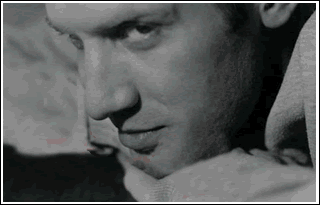
Independent film is dead. Long live the underground!" That's the slogan of Todd Verow and Jim Dwyer's "production company of the future," Bangor Films. To make their point, they set a goal in 1997 to complete 10 digital features by the year 2000.
The duo have made a self-sufficient digital video world where they crank out at least three movies a year and spend all of their time devoted to filmmaking. So far they have three in the can, three in the editing room, and two on location being shot.
You might remember Verow's name from the scuzzy, grungy queer film Frisk, which caused a "pink riot" on the closing night of the 1995 San Francisco Gay and Lesbian film festival. The dark slant of the film so enraged the audience that people came back after walking out just to boo the film at the end. Frisk went on to garner raves at Sundance and the Berlin Film Festival, but not before it reaped death threats for the filmmakers, and Verow received sinister calls for years afterwards.
 What he did next was a serious liberation of style. "After Frisk I decided to do a new experiment," says Verow, "shooting in video, in sequence, doing a lot of improvisation, and in real locations. The experiment turned into the first film in his Addiction Trilogy: Little Shots of Happiness (focusing on alcohol), followed by Shucking The Curve (drugs), and The Trouble with Perpetual Déjà Vu (sex). All three showcase knockout chicks wallowing their way through various forms of destruction, only to emerge wiser at the end. As Verow comments:
What he did next was a serious liberation of style. "After Frisk I decided to do a new experiment," says Verow, "shooting in video, in sequence, doing a lot of improvisation, and in real locations. The experiment turned into the first film in his Addiction Trilogy: Little Shots of Happiness (focusing on alcohol), followed by Shucking The Curve (drugs), and The Trouble with Perpetual Déjà Vu (sex). All three showcase knockout chicks wallowing their way through various forms of destruction, only to emerge wiser at the end. As Verow comments:
"Drinking and drugs, yeah, it's bad for you and people die and things like that. But it also serves a purpose. There can be some positive things from addiction in that, by overcoming it, you're able to become a better person. By experimenting and doing wild things, you grow. I think that's something that people don't really get. All the people I know that used to be drug addicts or alcoholics really understand life better than the people that have never done anything."
The films create a unique world with bizarre characters who float through strange circumstances, remaining both fascinating to watch and somewhat familiar to know. Like Mike Leigh on speed, Verow and Dwyer come up with characters and situations for them to go through, bring in the actors, discuss the characters in depth, and then go run into the world and shoot it all.
"If you're used to traditional filmmaking where you do this one shot and you sit in your trailer or in the hallway, and wait for the next one, it's hard for some actors," notes Verow. "But I try to shoot in sequence; it's really like you're the character. We'll shoot the scene before and the scene after that I'm not gonna use but I know it will help the actor to get to the point that I want them to get at. I think that's really key to getting to that sort of realism."
And what realism it is. Take the scene in Shucking the Curve when the fetching superstar Bonnie Dickenson and her friend are trying to kick a guy who overdosed in their apartment down the stairs so it looks like an accident, or The Trouble with Perpetual Déjà Vu, when the enchanting Devery Doleman drags her boyfriend into a movie theater bathroom for some hot sex.
"Shooting in digital video, I have my camera, we have an editing system here, so whenever we come up with an idea to do something we can just go out and do it instantly. We don't have to try and get money or secure locations, we can just go out and shoot it." A dream come true for most filmmakers. But Verow has higher goals: "Ideally, I'd like have a camera with me at all times and whenever I think of something -- or see something -- I can just instantly film it." With this new approach to filmmaking, Verow is creating a new set of rules, one that doesn't rely on the distribution train.
"No one is willing to try anything new or different because all they're concerned about is selling their movie to a distributor. Get this actor or that actor to be in it and make it as bland as possible so it will appeal to a mass audience. Independent filmmaking is supposed to be independent. Your main concern is supposed to be what is this movie I want to make and how am I going to make it in my own way with my own voice? That's the good thing about digital video: A lot of people are discovering 'Wow, I can do this movie completely on my own.' And that's why I'm really excited about it."
Sara Jacobson is an independent filmmaker who writes regularly about independent filmmakers for GettingIt.
